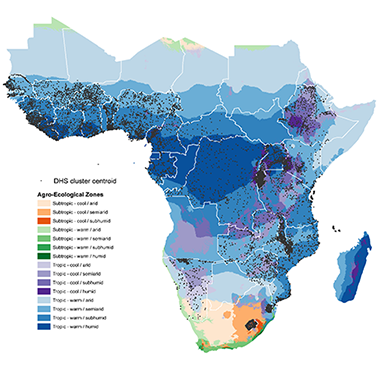HarvestChoice researchers summarize new data paradigm in the journal Nature Climate Change.
In a Nature Climate Change commentary published last year, Otto et al. highlight a scalar divide in data between natural and social sciences and point out the need for subnational socioeconomic datasets, calling for a “new paradigm in data gathering”.
But, as HarvestChoice researchers point out in a newly published letter to the editor, access to detailed socioeconomic data has been improving steadily over the past 15 years:
“Spatially explicit, harmonized socio-economic data products are increasingly available to the public, such as population and poverty grids, microdata derived from national household surveys, and rasterized sociodemographic indicators. While these products are often overlooked in the economic literature, they are well suited to the study of climate’s impact on human geography across scales.”
Subnational datasets allow researchers to analyze complex relationships between the environment and populations, for example, across relevant geographical domains (e.g., watersheds, farming systems and climatic zones). To make a point, by correlating bottom-up data pooled from Demographic and Health (DHS) Surveys with HarvestChoice’s agroecological zones, the authors present a quick spatial analysis showing early childhood wasting is significantly more prevalent in the arid and semi-arid zones of Africa south of the Sahara, confirmed by the first-order stochastic dominance analysis.
The authors note these types of granular datasets, especially those harmonized on high-resolution global grids, have already been used and will be increasingly used in economic and biophysical modeling analyses. More work surely needs to be done to address the world’s key challenges of food insecurity and climate change. But in terms of the data revolution, “the paradigm shift is alive and kicking already.”







